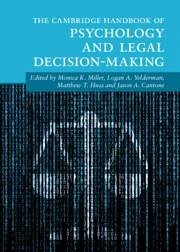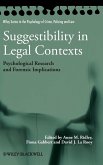The Cambridge Handbook of Psychology and Legal Decision-Making
Herausgeber: Miller, Monica K; Cantone, Jason A; Huss, Matthew T; Yelderman, Logan A
The Cambridge Handbook of Psychology and Legal Decision-Making
Herausgeber: Miller, Monica K; Cantone, Jason A; Huss, Matthew T; Yelderman, Logan A
- Gebundenes Buch
- Merkliste
- Auf die Merkliste
- Bewerten Bewerten
- Teilen
- Produkt teilen
- Produkterinnerung
- Produkterinnerung
"This Handbook provides students and researchers with a broad overview of existing literature in many areas of legal decision-making, including examples of decisions made by different professionals. Inspiring future research and practice, it will interest those in psychology, sociology, criminal justice, and more"--
Andere Kunden interessierten sich auch für
![Suggestibility in Legal Contexts Suggestibility in Legal Contexts]() Anne M RidleySuggestibility in Legal Contexts117,99 €
Anne M RidleySuggestibility in Legal Contexts117,99 €![Social Consciousness in Legal Decision Making Social Consciousness in Legal Decision Making]() Social Consciousness in Legal Decision Making85,99 €
Social Consciousness in Legal Decision Making85,99 €![Suggestibility in Legal Contexts Suggestibility in Legal Contexts]() Anne M RidleySuggestibility in Legal Contexts61,99 €
Anne M RidleySuggestibility in Legal Contexts61,99 €![The Cambridge Handbook of Wisdom The Cambridge Handbook of Wisdom]() The Cambridge Handbook of Wisdom184,99 €
The Cambridge Handbook of Wisdom184,99 €![The Cambridge Handbook of International Prevention Science The Cambridge Handbook of International Prevention Science]() The Cambridge Handbook of International Prevention Science258,99 €
The Cambridge Handbook of International Prevention Science258,99 €![The Cambridge Handbook of Creativity across Domains The Cambridge Handbook of Creativity across Domains]() The Cambridge Handbook of Creativity across Domains196,99 €
The Cambridge Handbook of Creativity across Domains196,99 €![The Cambridge Handbook of Evolutionary Perspectives on Human Behavior The Cambridge Handbook of Evolutionary Perspectives on Human Behavior]() The Cambridge Handbook of Evolutionary Perspectives on Human Behavior258,99 €
The Cambridge Handbook of Evolutionary Perspectives on Human Behavior258,99 €-
-
-
"This Handbook provides students and researchers with a broad overview of existing literature in many areas of legal decision-making, including examples of decisions made by different professionals. Inspiring future research and practice, it will interest those in psychology, sociology, criminal justice, and more"--
Hinweis: Dieser Artikel kann nur an eine deutsche Lieferadresse ausgeliefert werden.
Hinweis: Dieser Artikel kann nur an eine deutsche Lieferadresse ausgeliefert werden.
Produktdetails
- Produktdetails
- Verlag: Cambridge University Press
- Seitenzahl: 760
- Erscheinungstermin: 29. Februar 2024
- Englisch
- Abmessung: 254mm x 178mm x 40mm
- Gewicht: 1520g
- ISBN-13: 9781009100601
- ISBN-10: 1009100602
- Artikelnr.: 69228643
- Herstellerkennzeichnung
- Libri GmbH
- Europaallee 1
- 36244 Bad Hersfeld
- 06621 890
- Verlag: Cambridge University Press
- Seitenzahl: 760
- Erscheinungstermin: 29. Februar 2024
- Englisch
- Abmessung: 254mm x 178mm x 40mm
- Gewicht: 1520g
- ISBN-13: 9781009100601
- ISBN-10: 1009100602
- Artikelnr.: 69228643
- Herstellerkennzeichnung
- Libri GmbH
- Europaallee 1
- 36244 Bad Hersfeld
- 06621 890
Part I. Introductions: 1. A modern approach to the psychology of legal decision making
2. 'I Hope the final judgment's fair': alternative jurisprudences, legal decision-making, and justice
3. Diversity and bias in legal decision making: broadening frameworks and addressing overlooked issues
4: Judicial decision-making
Part II. Pre-trial phase decision-making: 5. Victim decision-making
6. Bystanders' crime reporting decisions
7. Pre-Trial publicity's effects on jurors' and judges' decision
8. Police decisions involved in collecting eyewitness identification evidence
9. Decisions related to miranda rights
10. Judges' daubert decisions
11. The psychology of confession decision making during police Interrogation
12. Plea bargaining: understanding the decision-making processes of plea negotiation
13. Forensic science decision-making: expertise lends both skills and vulnerabilities
14. Decision-making by forensic mental health evaluators
15. Interviewing suspects in criminal investigations: decisions and their consequences
16: Prosecutorial decision-making in cases of child sexual abuse: lessons from Australia
17. Decision-Making about restoration of defendants who are incompetent to stand trial
18. Clinical decision-making regarding criminal responsibility
19. Decision-Making regarding child victims and witnesses
Part III. Trial phase decision-making: 20. Social cognition of jury decision-making
21. Beliefs about juror decision-making and the jury process
22. Deciphering directives: juror decision-making challenges with understanding judicial instructions
23. Decisions surrounding the use of expert testimony
24. Legal and extra-legal factors that affect jurors' decisions
25. Decisions regarding insanity
26. Decision making in the shadow of evidence law
27. Decision-making in contested divorce child custody cases
Part IV. Post-conviction phase decisions: 28. Amenability to treatment evaluations: understanding decision points and new information regarding assessment
29. Choosing between life and death: capital jury penalty phase decision-making
30. The communication of risk to legal decision-makers
31. Psychology of parole decision-making
32. Probation decision-making
33. Decision-making in violence risk assessment
Part V. Other legal decision-making: 34. Decision making in immigration court
35. Evaluation decisions by psychologists about causation and damages in personal injury and employment discrimination cases: a pragmatic five-stage model for courts
36. Factors influencing the decision to commit white collar crime: integrating affluenza with established risks
37. Tort law decision-making: psychological and legal perspectives
38. Judicial decision-making in juvenile dependency and juvenile justice cases
39. Legislative decision making
40. Decision-Making in alternative dispute resolution
41. Criminal decision-making
42. Social worker decision-making: a framework for legally literate accountable practice
43. Decision-Making in civil matters: the role of substituted judgment
Part VI. Perspectives from the field: 44. Culturally competent perspectives and a legally literate practice promote quality decisions in social work
45. Making probation decisions in the real world
46. Justice for all: reflections as a clinician at the intersections
47. Police officer decisions in interrogations and investigations
48. Restoration: the sequel to incompetency to stand trial
49. To tell or not to tell
is that the question?: victim decision-making
50. Diversity in legal decision-making
Conclusion: 51. Conclusions from the field of legal decision-making.
2. 'I Hope the final judgment's fair': alternative jurisprudences, legal decision-making, and justice
3. Diversity and bias in legal decision making: broadening frameworks and addressing overlooked issues
4: Judicial decision-making
Part II. Pre-trial phase decision-making: 5. Victim decision-making
6. Bystanders' crime reporting decisions
7. Pre-Trial publicity's effects on jurors' and judges' decision
8. Police decisions involved in collecting eyewitness identification evidence
9. Decisions related to miranda rights
10. Judges' daubert decisions
11. The psychology of confession decision making during police Interrogation
12. Plea bargaining: understanding the decision-making processes of plea negotiation
13. Forensic science decision-making: expertise lends both skills and vulnerabilities
14. Decision-making by forensic mental health evaluators
15. Interviewing suspects in criminal investigations: decisions and their consequences
16: Prosecutorial decision-making in cases of child sexual abuse: lessons from Australia
17. Decision-Making about restoration of defendants who are incompetent to stand trial
18. Clinical decision-making regarding criminal responsibility
19. Decision-Making regarding child victims and witnesses
Part III. Trial phase decision-making: 20. Social cognition of jury decision-making
21. Beliefs about juror decision-making and the jury process
22. Deciphering directives: juror decision-making challenges with understanding judicial instructions
23. Decisions surrounding the use of expert testimony
24. Legal and extra-legal factors that affect jurors' decisions
25. Decisions regarding insanity
26. Decision making in the shadow of evidence law
27. Decision-making in contested divorce child custody cases
Part IV. Post-conviction phase decisions: 28. Amenability to treatment evaluations: understanding decision points and new information regarding assessment
29. Choosing between life and death: capital jury penalty phase decision-making
30. The communication of risk to legal decision-makers
31. Psychology of parole decision-making
32. Probation decision-making
33. Decision-making in violence risk assessment
Part V. Other legal decision-making: 34. Decision making in immigration court
35. Evaluation decisions by psychologists about causation and damages in personal injury and employment discrimination cases: a pragmatic five-stage model for courts
36. Factors influencing the decision to commit white collar crime: integrating affluenza with established risks
37. Tort law decision-making: psychological and legal perspectives
38. Judicial decision-making in juvenile dependency and juvenile justice cases
39. Legislative decision making
40. Decision-Making in alternative dispute resolution
41. Criminal decision-making
42. Social worker decision-making: a framework for legally literate accountable practice
43. Decision-Making in civil matters: the role of substituted judgment
Part VI. Perspectives from the field: 44. Culturally competent perspectives and a legally literate practice promote quality decisions in social work
45. Making probation decisions in the real world
46. Justice for all: reflections as a clinician at the intersections
47. Police officer decisions in interrogations and investigations
48. Restoration: the sequel to incompetency to stand trial
49. To tell or not to tell
is that the question?: victim decision-making
50. Diversity in legal decision-making
Conclusion: 51. Conclusions from the field of legal decision-making.
Part I. Introductions: 1. A modern approach to the psychology of legal decision making
2. 'I Hope the final judgment's fair': alternative jurisprudences, legal decision-making, and justice
3. Diversity and bias in legal decision making: broadening frameworks and addressing overlooked issues
4: Judicial decision-making
Part II. Pre-trial phase decision-making: 5. Victim decision-making
6. Bystanders' crime reporting decisions
7. Pre-Trial publicity's effects on jurors' and judges' decision
8. Police decisions involved in collecting eyewitness identification evidence
9. Decisions related to miranda rights
10. Judges' daubert decisions
11. The psychology of confession decision making during police Interrogation
12. Plea bargaining: understanding the decision-making processes of plea negotiation
13. Forensic science decision-making: expertise lends both skills and vulnerabilities
14. Decision-making by forensic mental health evaluators
15. Interviewing suspects in criminal investigations: decisions and their consequences
16: Prosecutorial decision-making in cases of child sexual abuse: lessons from Australia
17. Decision-Making about restoration of defendants who are incompetent to stand trial
18. Clinical decision-making regarding criminal responsibility
19. Decision-Making regarding child victims and witnesses
Part III. Trial phase decision-making: 20. Social cognition of jury decision-making
21. Beliefs about juror decision-making and the jury process
22. Deciphering directives: juror decision-making challenges with understanding judicial instructions
23. Decisions surrounding the use of expert testimony
24. Legal and extra-legal factors that affect jurors' decisions
25. Decisions regarding insanity
26. Decision making in the shadow of evidence law
27. Decision-making in contested divorce child custody cases
Part IV. Post-conviction phase decisions: 28. Amenability to treatment evaluations: understanding decision points and new information regarding assessment
29. Choosing between life and death: capital jury penalty phase decision-making
30. The communication of risk to legal decision-makers
31. Psychology of parole decision-making
32. Probation decision-making
33. Decision-making in violence risk assessment
Part V. Other legal decision-making: 34. Decision making in immigration court
35. Evaluation decisions by psychologists about causation and damages in personal injury and employment discrimination cases: a pragmatic five-stage model for courts
36. Factors influencing the decision to commit white collar crime: integrating affluenza with established risks
37. Tort law decision-making: psychological and legal perspectives
38. Judicial decision-making in juvenile dependency and juvenile justice cases
39. Legislative decision making
40. Decision-Making in alternative dispute resolution
41. Criminal decision-making
42. Social worker decision-making: a framework for legally literate accountable practice
43. Decision-Making in civil matters: the role of substituted judgment
Part VI. Perspectives from the field: 44. Culturally competent perspectives and a legally literate practice promote quality decisions in social work
45. Making probation decisions in the real world
46. Justice for all: reflections as a clinician at the intersections
47. Police officer decisions in interrogations and investigations
48. Restoration: the sequel to incompetency to stand trial
49. To tell or not to tell
is that the question?: victim decision-making
50. Diversity in legal decision-making
Conclusion: 51. Conclusions from the field of legal decision-making.
2. 'I Hope the final judgment's fair': alternative jurisprudences, legal decision-making, and justice
3. Diversity and bias in legal decision making: broadening frameworks and addressing overlooked issues
4: Judicial decision-making
Part II. Pre-trial phase decision-making: 5. Victim decision-making
6. Bystanders' crime reporting decisions
7. Pre-Trial publicity's effects on jurors' and judges' decision
8. Police decisions involved in collecting eyewitness identification evidence
9. Decisions related to miranda rights
10. Judges' daubert decisions
11. The psychology of confession decision making during police Interrogation
12. Plea bargaining: understanding the decision-making processes of plea negotiation
13. Forensic science decision-making: expertise lends both skills and vulnerabilities
14. Decision-making by forensic mental health evaluators
15. Interviewing suspects in criminal investigations: decisions and their consequences
16: Prosecutorial decision-making in cases of child sexual abuse: lessons from Australia
17. Decision-Making about restoration of defendants who are incompetent to stand trial
18. Clinical decision-making regarding criminal responsibility
19. Decision-Making regarding child victims and witnesses
Part III. Trial phase decision-making: 20. Social cognition of jury decision-making
21. Beliefs about juror decision-making and the jury process
22. Deciphering directives: juror decision-making challenges with understanding judicial instructions
23. Decisions surrounding the use of expert testimony
24. Legal and extra-legal factors that affect jurors' decisions
25. Decisions regarding insanity
26. Decision making in the shadow of evidence law
27. Decision-making in contested divorce child custody cases
Part IV. Post-conviction phase decisions: 28. Amenability to treatment evaluations: understanding decision points and new information regarding assessment
29. Choosing between life and death: capital jury penalty phase decision-making
30. The communication of risk to legal decision-makers
31. Psychology of parole decision-making
32. Probation decision-making
33. Decision-making in violence risk assessment
Part V. Other legal decision-making: 34. Decision making in immigration court
35. Evaluation decisions by psychologists about causation and damages in personal injury and employment discrimination cases: a pragmatic five-stage model for courts
36. Factors influencing the decision to commit white collar crime: integrating affluenza with established risks
37. Tort law decision-making: psychological and legal perspectives
38. Judicial decision-making in juvenile dependency and juvenile justice cases
39. Legislative decision making
40. Decision-Making in alternative dispute resolution
41. Criminal decision-making
42. Social worker decision-making: a framework for legally literate accountable practice
43. Decision-Making in civil matters: the role of substituted judgment
Part VI. Perspectives from the field: 44. Culturally competent perspectives and a legally literate practice promote quality decisions in social work
45. Making probation decisions in the real world
46. Justice for all: reflections as a clinician at the intersections
47. Police officer decisions in interrogations and investigations
48. Restoration: the sequel to incompetency to stand trial
49. To tell or not to tell
is that the question?: victim decision-making
50. Diversity in legal decision-making
Conclusion: 51. Conclusions from the field of legal decision-making.








